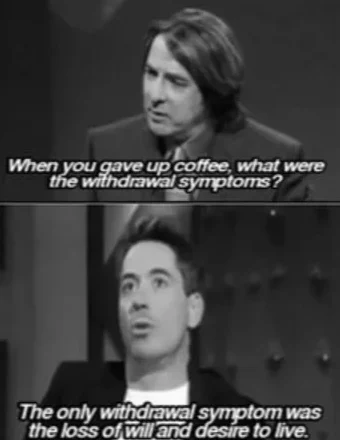
Welcome to a transformative journey towards a healthier lifestyle as we explore the remarkable benefits of bidding farewell to caffeine. Discover how quitting caffeine can revolutionize your well-being and unlock a world of positive changes. From enhanced energy levels to improved sleep quality, join us as we delve into the 9 amazing advantages of embracing a caffeine-free life. Say goodbye to jitters and hello to vitality – let's embark on this caffeine-free adventure together!
What is Caffeine?
Caffeine, a natural stimulant most commonly found in coffee, tea, and cacao plants, invigorates the central nervous system and keeps drowsiness at bay, making it the world's most widely consumed psychoactive substance. Scientifically known as 1,3,7-trimethylxanthine and it's also referred to by names such as theine, mateine, guaranine, and methyl theobromine. Upon consumption, caffeine is rapidly absorbed by the body, typically reaching peak levels in the bloodstream within an hour, where it then acts as an adenosine receptor antagonist. By blocking the neurotransmitter adenosine, which promotes sleep and relaxation, caffeine temporarily wards off fatigue and enhances alertness, giving that well-known energy boost.
How Caffeine Affects the Body?
Caffeine's influence on the body extends beyond its well-known energy-boosting effects. Upon consumption, caffeine rapidly travels to the brain, where it blocks adenosine receptors, leading to increased dopamine levels and heightened alertness. However, this stimulant also triggers the release of stress hormones like cortisol and adrenaline, which can cause anxiety, restlessness, and sleep disturbances. Moreover, caffeine can lead to dehydration, digestive issues, and increased heart rate. By understanding these effects, we can appreciate the potential benefits of quitting caffeine and allowing our bodies to restore their natural balance.
The top benefits of Quitting Caffeine
| Benefit | Description |
|---|---|
| The Impact of Caffeine on Sleep | Discover how ditching caffeine can lead to deeper, more restful sleep and eliminate the disruptive effects on your sleep cycle. |
| Caffeine and Mental Well-being | Learn about the positive changes in mood and anxiety levels that come with reducing caffeine intake, leading to improved mental health. |
| Physical Health Advantages | Explore the myriad of physical health benefits, from lower blood pressure to improved digestion, that quitting caffeine can offer. |
| Nutrient Absorption and Diet | Understand how going caffeine-free can enhance the absorption of vital nutrients and promote a more balanced diet. |
| Weight Management Considerations | Find out how eliminating caffeine can aid in weight management and potentially help reduce belly fat. |
| Steering Through Caffeine Withdrawal | Get tips on how to smoothly transition away from caffeine and manage withdrawal symptoms for a healthier lifestyle. |
| Long-Term Health Outcomes | Gain insight into the long-term health benefits of quitting caffeine, including better skin health and hormonal balance. |
| Chronic Disease Risk Reduction | See how cutting out caffeine can lower the risk of developing chronic diseases and contribute to a healthier heart and body. |
| Enhancing Overall Quality of Life | Embrace the overall improvements in daily life, from increased energy levels to financial savings, by saying goodbye to caffeine. |
1. The Impact of Caffeine on Sleep

Caffeine and sleep have a complex relationship that can significantly impact your overall health. Caffeine, with its stimulating properties, can interfere with your natural sleep cycle by delaying the onset of sleep and reducing total sleep time. This is because caffeine has a half-life of 5 to 7 hours, meaning that even if you consume it in the early afternoon, it can still affect your sleep quality at night. By quitting caffeine, you allow your body to regulate its sleep-wake cycle more effectively, leading to deeper, more restorative sleep.
The following table outlines the benefits of quitting caffeine on sleep:
| Benefit | Description |
|---|---|
| Increased Melatonin Production | Quitting caffeine allows your brain to produce more melatonin, a hormone that regulates sleep-wake cycles. |
| Reduced Sleep Disturbances | Eliminating caffeine reduces the likelihood of experiencing insomnia, restless leg syndrome, and other sleep disturbances. |
| Improved Sleep Quality | Without caffeine, your body can enter deeper stages of sleep, allowing for better rest and rejuvenation. |
| Enhanced Energy Levels | Improved sleep quality leads to increased energy levels during the day. |
| Better Mood Regulation | A good night's sleep can help regulate your mood and reduce irritability or anxiety. |
2. Caffeine and Mental Well-being
Caffeine's impact on mental well-being is a complex interplay of benefits and drawbacks. On one hand, caffeine can enhance focus, alertness, and cognitive performance, making it a popular choice for those seeking a productivity boost. High caffeine intake can exacerbate anxiety symptoms, leading to increased heart rate, restlessness, and difficulty concentrating. Moreover, caffeine can cause mood swings, making it challenging to maintain emotional stability throughout the day. By quitting caffeine, you can pave the way for a more balanced emotional state and improved mental well-being.
Caffeine's Impact on Anxiety and Mood Fluctuations
| Symptoms | Caffeine's Effect |
|---|---|
| Increased heart rate | Intensify |
| Restlessness | Intensify |
| Difficulty concentrating | Intensify |
| Mood swings | Intensify |
| Emotional stability | Improves |
| Anxiety management | Improves |
Caffeine's Role in Stress Response
Caffeine and stress share a complex relationship, often exacerbating each other's effects. Caffeine can trigger the release of stress hormones like cortisol and adrenaline, leading to increased heart rate, blood pressure, and anxiety. This response, while beneficial in short bursts, can become detrimental when combined with chronic stress. As a result, quitting caffeine can significantly improve your body's stress management and overall well-being.
Caffeine's Impact on Stress Response
| Factor | Caffeine Intake | Stress Response |
|---|---|---|
| Heart Rate | Increased | Increased |
| Blood Pressure | Increased | Increased |
| Anxiety | Increased | Increased |
| Sleep Quality | Disrupted | Disrupted |
| Energy Levels | Temporary Boost | Reduced |
| Mood | Agitated | Agitated |
3. Physical Health Advantages

The decision to quit caffeine can have a profound impact on various aspects of physical health, particularly heart health, blood pressure, hydration, and digestion.
Caffeine consumption can lead to temporary spikes in blood pressure, which, over time, may affect heart health. Studies suggest that quitting caffeine may contribute to a lower risk of heart disease by allowing blood pressure levels to normalize.
| Health Aspect | With Caffeine | After Quitting Caffeine |
|---|---|---|
| Blood Pressure | Elevated | Reduced |
| Heart Rate | Increased | Slows Down |
| Risk of Heart Disease | Higher | Lower |
Reducing caffeine intake can lead to noticeable improvements in blood pressure and heart rate. This table illustrates the general trend observed in individuals who cut caffeine from their diet, although individual responses may vary.
4. Nutrient Absorption and Diet
The decision to quit caffeine can significantly influence nutrient absorption and dietary habits, contributing to overall health and well-being. Here we examine the impact of caffeine cessation on the absorption of essential micronutrients and weight management
Cutting out caffeine can enhance the body's absorption of crucial nutrients such as calcium, iron, and B vitamins. Caffeine contains substances known as tannins, which can interfere with the absorption of these micronutrients, making them less available to the body. This is particularly beneficial for those who consume caffeine above the recommended levels or for older individuals, who may be at risk of deficiencies.
5. Weight Management Considerations
Quitting caffeine can also play a role in managing weight. While caffeine itself is not necessarily linked to weight gain, it can influence eating habits and stress responses. High caffeine intake has been associated with increased levels of cortisol, a stress hormone that can lead to cravings for high-calorie foods and weight gain. By quitting caffeine, individuals may see a balance in their body's and brain's chemistry, leading to more stable hormone levels and potentially aiding in weight management. Additionally, caffeine can disrupt sleep patterns, and poor sleep has been linked to weight gain. By improving your sleep quality through caffeine reduction, you may find it easier to maintain a healthy weight. However, it's essential to remember that a balanced diet and regular exercise are crucial for effective weight management.
6. Steering Through Caffeine Withdrawal
When one decides to quit caffeine, understanding the withdrawal process is essential for a successful transition away from reliance on this stimulant. Recognizing the symptoms of withdrawal and implementing strategies for reducing intake can significantly ease the journey.
Recognizing Withdrawal Symptoms
Caffeine withdrawal symptoms typically begin 12 to 24 hours after cessation and peak at 20–51 hours, potentially lasting up to nine days. These symptoms can include:
- Headache
- Fatigue
- Decreased energy/activeness
- Decreased alertness
- Drowsiness
- Decreased contentedness
- Depressed mood
- Difficulty concentrating
- Irritability
- Feeling foggy/not clearheaded
7. Long-Term Health Outcomes
Quitting caffeine can have significant long-term health benefits. Studies have shown that reducing caffeine intake can lower the risk of developing type 2 diabetes by up to 30%. Moreover, a study published in the Journal of Alzheimer's Disease found that consuming 3-5 cups of coffee per day during midlife can increase the risk of dementia and Alzheimer's disease by 65%. By cutting out caffeine, you may protect your brain health and reduce the likelihood of cognitive decline. Additionally, ditching caffeine can improve your cardiovascular health by reducing blood pressure and lowering the risk of heart disease. Embrace the long-term perks of a caffeine-free life and invest in your future well-being.
8. Chronic Disease Risk Reduction
One of the most impactful long-term benefits of quitting caffeine is the potential reduction in the risk of developing chronic diseases. Studies indicate that high caffeine consumption is associated with an increase in blood pressure, which can lead to a heightened risk of cardiovascular disease. By reducing caffeine intake, individuals may see a decrease in blood pressure levels, thereby lowering the risk of heart conditions. Furthermore, caffeine cessation can contribute to a slower heart rate and improved heart health overall.
| Health Aspect | Benefit of Quitting Caffeine |
|---|---|
| Blood Pressure | Decrease in blood pressure levels |
| Heart Rate | Reduction and stabilization |
| Cardiovascular Disease | Lowered risk |
9. Enhancing Overall Quality of Life
The quality of life can also see significant improvement without caffeine. One of the key factors contributing to this is the enhancement of sleep quality. Caffeine can disrupt sleep patterns, making it harder to fall asleep and reducing the time spent in deep, restorative sleep. Eliminating caffeine can therefore improve both sleep initiation and sleep quality , leading to a more restful and rejuvenating night's sleep.
| Aspect of Life | Improvement from Quitting Caffeine |
|---|---|
| Sleep Quality | Improvement in falling and staying asleep |
| Mental Well-being | Increased mental clarity and mood stability |
| Daily Performance | Enhanced due to better rest |
Caution: The Road to a Caffeine-Free Life

It's important to be aware that sudden cessation can lead to withdrawal symptoms such as headaches, fatigue, irritability, and difficulty concentrating. These symptoms typically peak within the first 48 hours and can last anywhere from two to nine days. Always consult with a healthcare professional before making significant changes to your caffeine consumption, especially if you have pre-existing health concerns.
By approaching the process with care and possibly tapering your intake, you can minimize potential risks and set the stage for a successful transition to a caffeine-free lifestyle.
FAQs Related to Quitting Caffeine
What's the Big Deal about Quitting Caffeine?
Quitting caffeine can lead to improved sleep quality, better mood, and enhanced mental clarity, among other amazing benefits. Say goodbye to jitters and hello to a healthier, more vibrant you!
Can Quitting Caffeine really Improve my Sleep?
Absolutely! By cutting out caffeine, you can enjoy deeper, more restorative sleep, free from the disruptive effects of caffeine on your sleep cycle.
Will I Experience Withdrawal Symptoms when I Quit Caffeine?
Yes, you might experience some withdrawal symptoms like headaches, irritability, and fatigue. But don't worry – these symptoms are temporary and can be managed with proper preparation and support.
How does Quitting Caffeine Impact my Mental Health?
Quitting caffeine can lead to reduced anxiety and improved mood, as caffeine can exacerbate feelings of stress and anxiety. Embrace a calmer, more balanced state of mind.
What about my Energy Levels? Won't I Feel Tired without Caffeine?
While you might experience a temporary dip in energy levels during the withdrawal period, quitting caffeine can actually lead to more stable and sustainable energy throughout the day.
Is it Worth it to Quit Caffeine?
Absolutely! Quitting caffeine can lead to a host of benefits, from improved physical health to better mental well-being. Plus, you'll save money and enjoy a more balanced, mindful approach to life. So why not give it a try and see the difference for yourself?
Wrapping Up the Buzz: Embrace Benefits of Quitting Caffeine
To wrap things up, quitting caffeine can lead to a host of surprising benefits for your physical and mental well-being. From improved sleep quality and reduced anxiety to better nutrient absorption and a brighter smile, the advantages of going caffeine-free are backed by scientific research. Studies show that consuming more than 400mg of caffeine per day can increase the risk of adverse effects, while cutting back can lead to noticeable improvements in as little as 12 hours. Although the initial withdrawal symptoms may be challenging, with 96% of people experiencing headaches and fatigue, the long-term rewards are well worth the effort.
By embracing a caffeine-free lifestyle, you can unlock your body's natural potential for balanced energy, better mood, and optimal health. So, if you're ready to unveil the truth behind the buzz and experience the life-changing perks of quitting caffeine, now is the perfect time to start your journey.
If you found this article intriguing, you might also enjoy exploring our other pieces: “Does Magnesium Boost Testosterone? Decoding The Science” uncovers the fascinating link between this essential mineral and male hormone levels, while “12 Chocolate Seduction Secrets: Ignite Passion and Romance” reveals how to harness the power of chocolate to spice up your love life.







